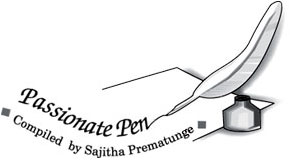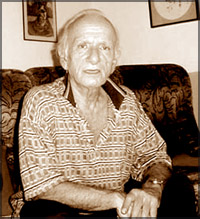 The
coming of English The
coming of English
by Carl Muller
Just a few centuries ago, the English were "foreigners" from the
Continent. They came to the Isles as successive races of conquerors and
laid down the foundations of the British character and the language we
now speak, read and write.
First, as we know, came the Celts - a brilliant and imaginative race
who are the forbears of today's modern Irish and Welsh. They were
followed by the Romans in 55 B. C., the Anglo-Saxons in 449 A.D., the
Danes in the ninth century and the Norman-French in 1066.
It was from the German tribe, the Saxons, and their neighbours, the
Angles (that gave us the word "English") that the English language
derived a great of the common words.
It may be quite incredible to know that one out of every 25 words
frequently used in English constitute a quarter of all spoken and
written English, stretching from "the" (the most common) to "have" and
"at". All these words are of Saxon origin.
The Normans, on the other hand spoke a modified Latin, and we find
their contribution to English in words like "beautiful", "magnificent',
"splendid", "recognize," "remember", and "hesitate".
 The Anglo-Saxon period was from 449 to 1066. This race came to
England as pagans, and their main contribution is seen in the names by
which we still designate the days of the week. "Sunday" and "Monday"
tell us that the Anglo-Saxons did, at some time, worship the sun and the
moon. The Anglo-Saxon period was from 449 to 1066. This race came to
England as pagans, and their main contribution is seen in the names by
which we still designate the days of the week. "Sunday" and "Monday"
tell us that the Anglo-Saxons did, at some time, worship the sun and the
moon.
In "Tuesday" is preserved the name of Tiw - an evil deity.
"Wednesday" is the day of Wodin, the Teutonic Mars; "Thursday" of Thor,
the god of thunder, "Friday" of Freya, the northern Venus and goddess of
peace, joy and fruitfulness; and "Saturday" of Saetere, a water deity.
This last seems only natural because these primitive Saxons had come
to a live in a land surrounded by the sea and subject to much mist and
rain. It is the language that the Saxons brought to England that is the
English we read, write and speak today, and we must mind that it was a
dialect of German.
But also, when the Saxons landed at Ebbsfleet, England, they had a
literature - not written but transmitted by word of mouth. It is from
the fragments of this literature that still exist, that scholars have
been able to construct a picture of the lives of the early Saxon "scops"
or poets. What was such a poet like? He was happiest, harp in hand,
chanting in the drinking halls before warrior chiefs. He would be
listened to and rewarded with applause and ale.
One such song is the greatest of Saxon poems - "Beowulf" - that has
come down to us and to our day. "Beowulf" is an epic of 3,178 lines. Let
me give you one verse that tells of the death of Beowulf;
Neigling was broken; old and grey-headed,
Beowulf found in his sword no salvation.
The fangs of the worm seized the throat of the hero;
And welled forth in waves Beowulf's life-blood.
But Weglaf was worthy; his sword smote dragon
And Beowulf's dagger divided the demon.
Kinsmen and athelings, they cast forth the spirit.
Thus Beowulf perished, undaunted, unvanquished.
You will see how "Beowulf" was based on alliteration and not on rhyme
- and this verse form persisted as the standard of English poetry until
the coming of Chaucer. I might add that in the verse quoted, "Neigling"
means big sword, and "Athelings" are princes.
During the late Anglo-Saxon period, literature was produced and
preserved by the monasteries that had been established by Roman
missionaries in the early Christian era.
We thus have Bede the Venerable who lived circa 673 and was later
called "The Father of English Prose". He left for us "An Ecclesiastical
History of England" written in Latin, and which gave a record of the
times and writers of that day. He mentions Caedmon, a lay Brother who,
later in life, gave the people a paraphrase of the story of Creation, as
well as Old Testament stories.
Another poet, Cynewulf, carried on Caedmon's work, using themes from
the New Testament and early Church history.
It was in this age that Alfred the Great became King of England.
Around him, many legends have been moven, and Alfred was both a writer
and a patron of literature, giving life to a considerable body of
literary work.
****
See your words in print?
Dear readers,
Email your poems and short stories to [email protected] or
post them to "Passionate Pen", Sunday Observer, Associated Newspapers of
Ceylon Limited, Number 35, D.R. Wijewardene Mawatha, Colombo 10.
Please be patient and do not be discouraged if the publication of
your poems/short stories is delayed. Most of the poems which we received
were subject to rejection because they were too long. Please make an
effort to limit your poems to less than
thirty lines and the short stories to
less than 1,500 words, in order
to avoid rejection.
Next week onwards you can look forward to new changes in Passionate
Pen, where you will be able to learn a lot from professional writers.
Sajitha Prematunge |
